Key takeaways:
- Wicket challenges highlight the psychological aspects of the game, where decisions can shift momentum and impact players’ mental states.
- Identifying personal challenges includes dealing with unpredictability, external pressure, and emotional responses, all crucial for growth and resilience.
- Strategic response plans should prioritize clear objectives, adaptability, and effective communication to enhance team performance under pressure.
- Learning from feedback through critical self-review and team discussions fosters skill development and improves overall performance.
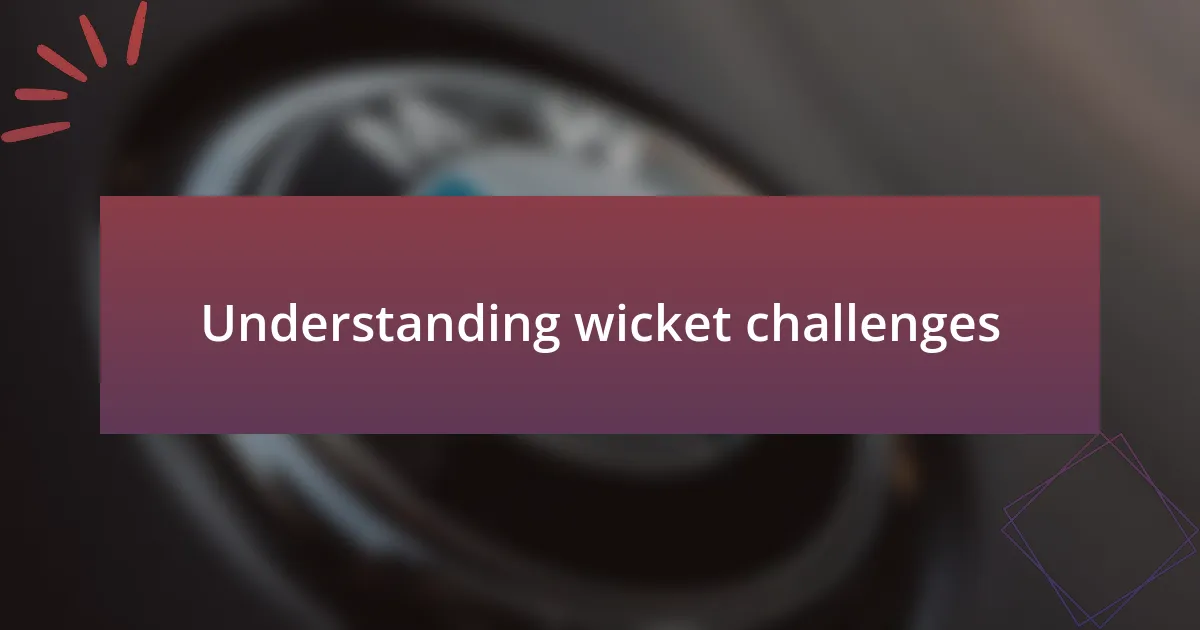
Understanding wicket challenges
Wicket challenges can often feel like a test of one’s mental fortitude. I remember a particular match where a seemingly innocent delivery turned into a fierce debate about whether the ball had touched the bat before being caught. It made me realize how pivotal these moments are in shaping the game and a player’s mindset.
Understanding wicket challenges isn’t just about the technicalities; it’s about connecting with the emotional weight behind them. Have you ever felt your heart race as the third umpire deliberates? That feeling of anticipation can be overwhelming, and it brings to light the psychological aspects of the game that often go unnoticed.
At its core, a wicket challenge underscores the thin line between triumph and despair in cricket. I often think about how each decision can drastically shift the momentum of a game. Reflecting on these moments helps one appreciate the complexities of cricket and the journeys we all embark on with every delivery bowled and every run scored.
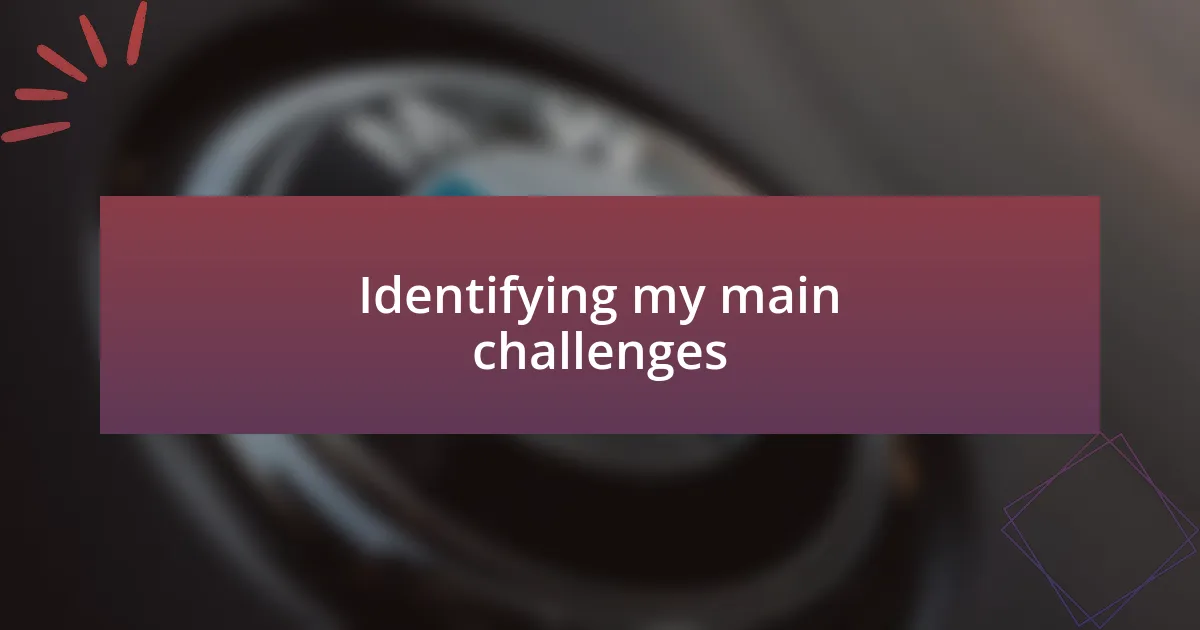
Identifying my main challenges
Identifying my main challenges often revolves around the unpredictability of the game itself. For instance, I vividly recall a time when a close call left me second-guessing myself. It wasn’t just about whether the ball hit the bat; it was the uncertainty that lingered even after the decision was made. This moment stands out as a reminder of how quickly confidence can wobble in the face of doubt.
Another key challenge lies in the pressure of external expectations. During a crucial match, I felt the weight of my teammates and fans watching my every move. They were invested in the outcome, and it added a layer of stress that was hard to shake off. Balancing the desire to perform with the fear of letting others down can be incredibly daunting.
Additionally, my emotional responses can sometimes cloud judgment. There was a time when I struggled to remain calm after a contentious decision went against us. I learned that maintaining composure is just as vital as technical skill when handling these intense moments. In reflecting on these challenges, I see how they contribute to my growth and resilience as a player.
| Challenge | Description |
|---|---|
| Unpredictability | Second-guessing myself after close calls. |
| Pressure | The weight of expectations from teammates and fans. |
| Emotional Response | Struggling to maintain composure in tense situations. |
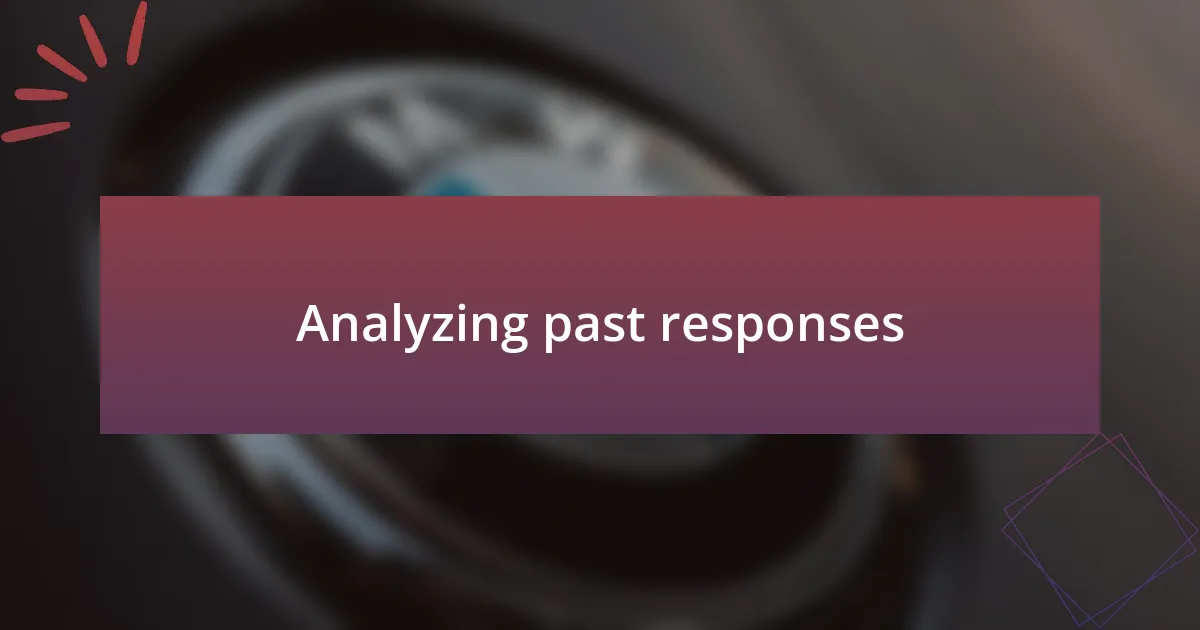
Analyzing past responses
When I reflect on past responses to challenges, I find that my approach often evolved based on the situation. There was a match where I misjudged a ball, and rather than dwelling on the mistake, I chose to learn from it. I remember replaying that moment in my mind, examining not just the choice itself but also my reaction afterward. This practice of introspection is crucial; it helps me to identify patterns in my decision-making during pressure situations.
- Analyzing the impact of misjudged calls deepened my understanding of game dynamics.
- I recognized that a quick mental shift can break the cycle of negativity after a mistake.
- I learned to embrace mistakes as part of my growth, rather than viewing them as faults.
In another instance, during a tense game, I felt my adrenaline rising as tensions escalated on the field. I responded by reminding myself to focus on the task rather than the external pressures. In retrospect, that moment reinforced the importance of mental clarity and determination in navigating challenges, especially when external factors are at play. It’s fascinating how these moments of reflection not only enhance my performance but also shape my mindset for future games.
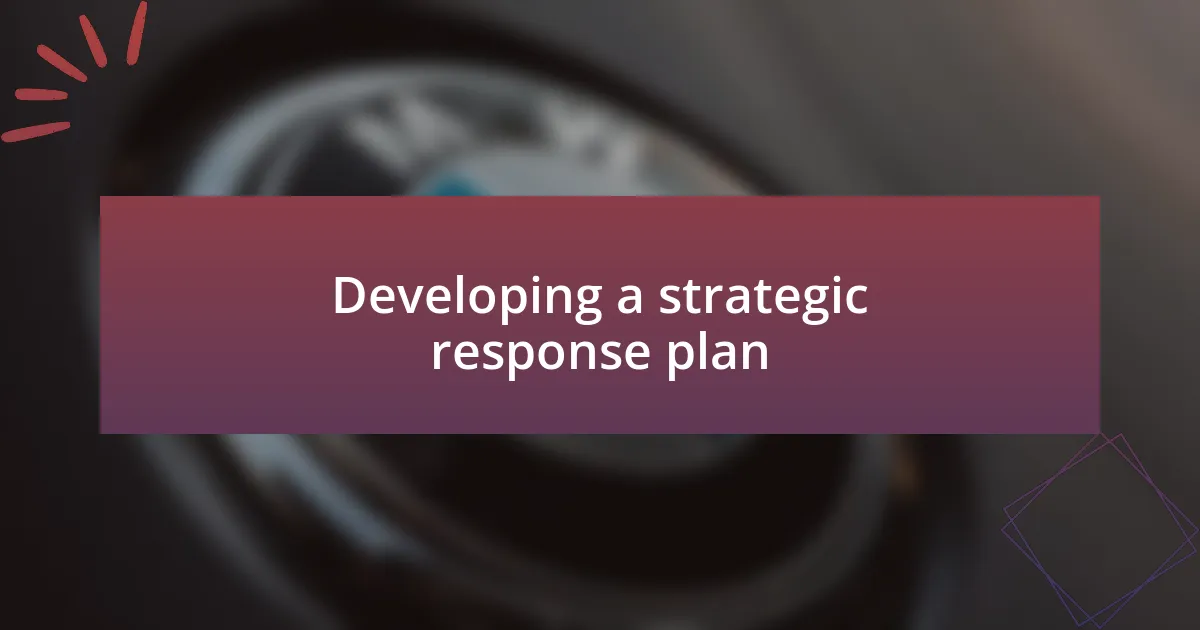
Developing a strategic response plan
When developing a strategic response plan, I find it essential to clearly outline my priorities. I recall a high-stakes game where my team was under immense pressure, and I took a moment to jot down our key objectives. This simple act not only calmed my nerves but also refocused the team’s energy on what truly mattered. Have you ever found that writing down your thoughts helps you see the bigger picture?
I always emphasize the importance of adaptability in my response strategy. I remember during a particularly challenging match, my initial plan quickly fell apart. Instead of panicking, I reminded myself that flexibility allows for real-time adjustments. It struck me then that having a plan is just part of it; being open to change is where real resilience shines through.
Another element I incorporate is communication with my teammates. I think back to a game where a lack of clear communication almost cost us a critical point. In that moment, I realized that my strategic response plan must include regular check-ins with my teammates to ensure we’re all aligned. Being on the same page not only enhances our performance but also creates a sense of unity that can elevate our play under pressure. How do you keep that communication line open during tense moments?
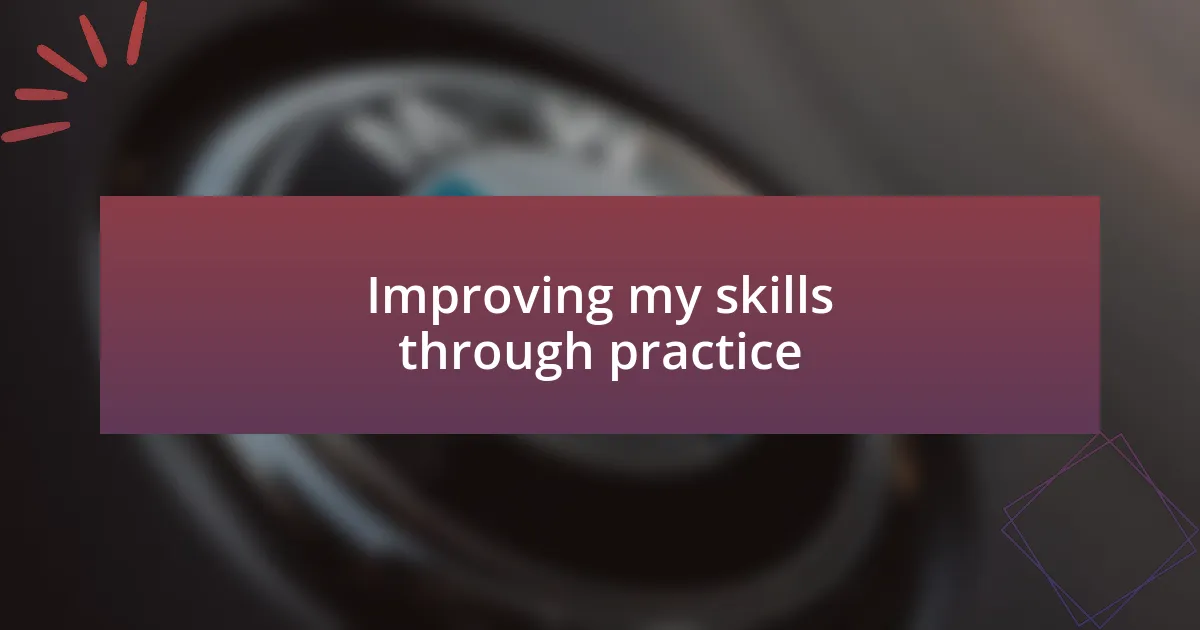
Improving my skills through practice
Improving my skills through practice is a journey I take seriously. There was a time when I struggled with my batting technique. I set aside specific practice sessions, focusing solely on my swing mechanics. Over time, I noticed my confidence growing, proving that dedicated practice can transform weaknesses into strengths.
I believe that consistency is key to skill development. I remember when I committed to practicing for an hour every day, even when my schedule was tight. Initially, it felt exhausting, but those sessions turned into a rewarding ritual. Have you ever felt the satisfaction of seeing measurable progress after dedicated practice? It’s a rush like no other.
Embracing feedback during practice sessions has also been a game-changer for me. Once, after a frustrating training session, a teammate pointed out small adjustments in my stance. Implementing that feedback not only improved my performance but also fostered a sense of collaboration. The experience reminded me that growth often comes from the insights of others, and being open to their perspectives can lead to significant improvement. How do you incorporate feedback into your own practice?
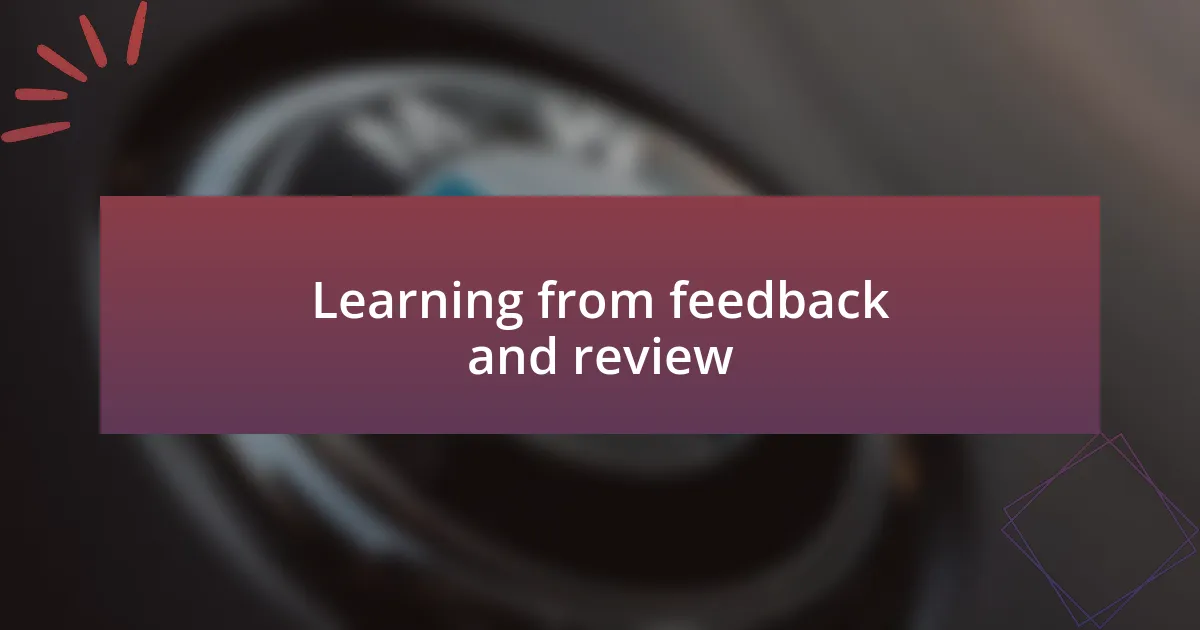
Learning from feedback and review
Receiving feedback can sometimes feel daunting. I recall a moment during a crucial match when a coach pointed out my tendency to rush my deliveries. At first, I felt defensive, but as I reflected on his observations, I realized he was offering a perspective I hadn’t considered. This shift in mindset allowed me to slow down, focus, and ultimately make better decisions on the field. Isn’t it fascinating how a simple suggestion can lead to profound change?
After every game, I make it a habit to review my performance critically. I often jot down notes about what went well and what needed improvement. There was a time when I overlooked my weaknesses, thinking they’d resolve themselves, but ignoring them only hindered my growth. By analyzing my gameplay, I learned to confront what challenged me head-on and implement changes for the next match. Isn’t it empowering to take control of your development this way?
Sometimes, it’s not just about individual feedback but also the collective review as a team. I remember our post-match discussions; we would gather to share insights and observations. Hearing different perspectives helped me understand how my role affected the overall performance. Have you ever felt that collective review can elevate your understanding beyond your own experiences? Embracing that collaborative spirit was pivotal for my growth—it made me realize that we all learn from each other.



